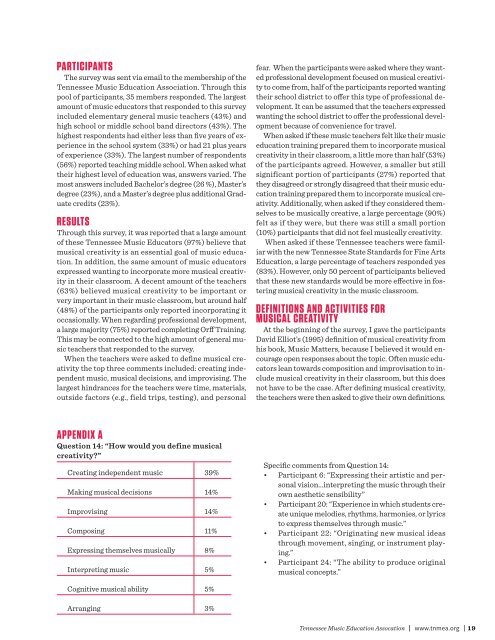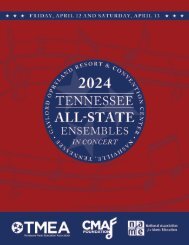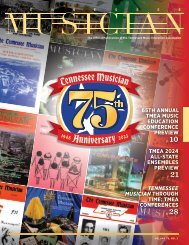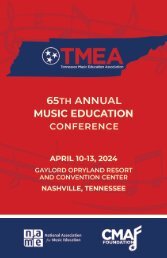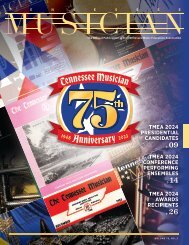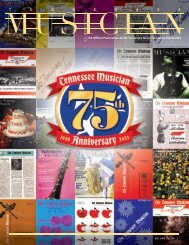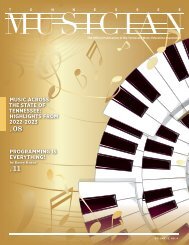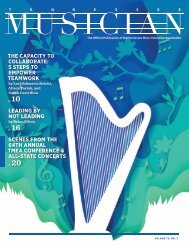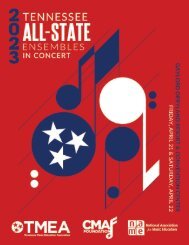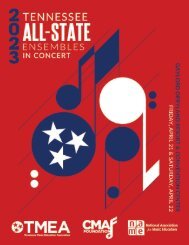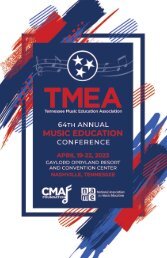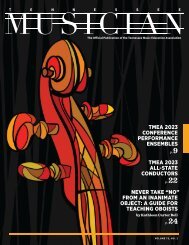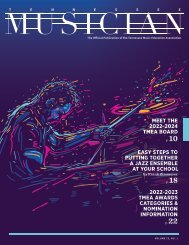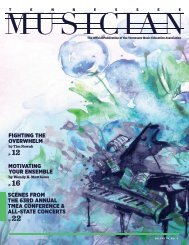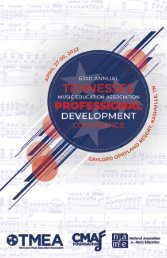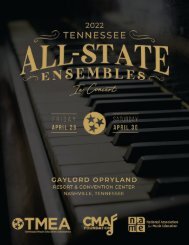TN Musician Vol. 71 No. 2
You also want an ePaper? Increase the reach of your titles
YUMPU automatically turns print PDFs into web optimized ePapers that Google loves.
PARTICIPANTS<br />
The survey was sent via email to the membership of the<br />
Tennessee Music Education Association. Through this<br />
pool of participants, 35 members responded. The largest<br />
amount of music educators that responded to this survey<br />
included elementary general music teachers (43%) and<br />
high school or middle school band directors (43%). The<br />
highest respondents had either less than five years of experience<br />
in the school system (33%) or had 21 plus years<br />
of experience (33%). The largest number of respondents<br />
(56%) reported teaching middle school. When asked what<br />
their highest level of education was, answers varied. The<br />
most answers included Bachelor’s degree (26 %), Master’s<br />
degree (23%), and a Master’s degree plus additional Graduate<br />
credits (23%).<br />
RESULTS<br />
Through this survey, it was reported that a large amount<br />
of these Tennessee Music Educators (97%) believe that<br />
musical creativity is an essential goal of music education.<br />
In addition, the same amount of music educators<br />
expressed wanting to incorporate more musical creativity<br />
in their classroom. A decent amount of the teachers<br />
(63%) believed musical creativity to be important or<br />
very important in their music classroom, but around half<br />
(48%) of the participants only reported incorporating it<br />
occasionally. When regarding professional development,<br />
a large majority (75%) reported completing Orff Training.<br />
This may be connected to the high amount of general music<br />
teachers that responded to the survey.<br />
When the teachers were asked to define musical creativity<br />
the top three comments included: creating independent<br />
music, musical decisions, and improvising. The<br />
largest hindrances for the teachers were time, materials,<br />
outside factors (e.g., field trips, testing), and personal<br />
fear. When the participants were asked where they wanted<br />
professional development focused on musical creativity<br />
to come from, half of the participants reported wanting<br />
their school district to offer this type of professional development.<br />
It can be assumed that the teachers expressed<br />
wanting the school district to offer the professional development<br />
because of convenience for travel.<br />
When asked if these music teachers felt like their music<br />
education training prepared them to incorporate musical<br />
creativity in their classroom, a little more than half (53%)<br />
of the participants agreed. However, a smaller but still<br />
significant portion of participants (27%) reported that<br />
they disagreed or strongly disagreed that their music education<br />
training prepared them to incorporate musical creativity.<br />
Additionally, when asked if they considered themselves<br />
to be musically creative, a large percentage (90%)<br />
felt as if they were, but there was still a small portion<br />
(10%) participants that did not feel musically creativity.<br />
When asked if these Tennessee teachers were familiar<br />
with the new Tennessee State Standards for Fine Arts<br />
Education, a large percentage of teachers responded yes<br />
(83%). However, only 50 percent of participants believed<br />
that these new standards would be more effective in fostering<br />
musical creativity in the music classroom.<br />
DEFINITIONS AND ACTIVITIES FOR<br />
MUSICAL CREATIVITY<br />
At the beginning of the survey, I gave the participants<br />
David Elliot’s (1995) definition of musical creativity from<br />
his book, Music Matters, because I believed it would encourage<br />
open responses about the topic. Often music educators<br />
lean towards composition and improvisation to include<br />
musical creativity in their classroom, but this does<br />
not have to be the case. After defining musical creativity,<br />
the teachers were then asked to give their own definitions.<br />
APPENDIX A<br />
Question 14: “How would you define musical<br />
creativity?”<br />
Creating independent music 39%<br />
Making musical decisions 14%<br />
Improvising 14%<br />
Composing 11%<br />
Expressing themselves musically 8%<br />
Interpreting music 5%<br />
Specific comments from Question 14:<br />
• Participant 6: “Expressing their artistic and personal<br />
vision...interpreting the music through their<br />
own aesthetic sensibility”<br />
• Participant 20: “Experience in which students create<br />
unique melodies, rhythms, harmonies, or lyrics<br />
to express themselves through music.”<br />
• Participant 22: “Originating new musical ideas<br />
through movement, singing, or instrument playing.”<br />
• Participant 24: “The ability to produce original<br />
musical concepts.”<br />
Cognitive musical ability 5%<br />
Arranging 3%<br />
Tennessee Music Education Assocation | www.tnmea.org | 19


